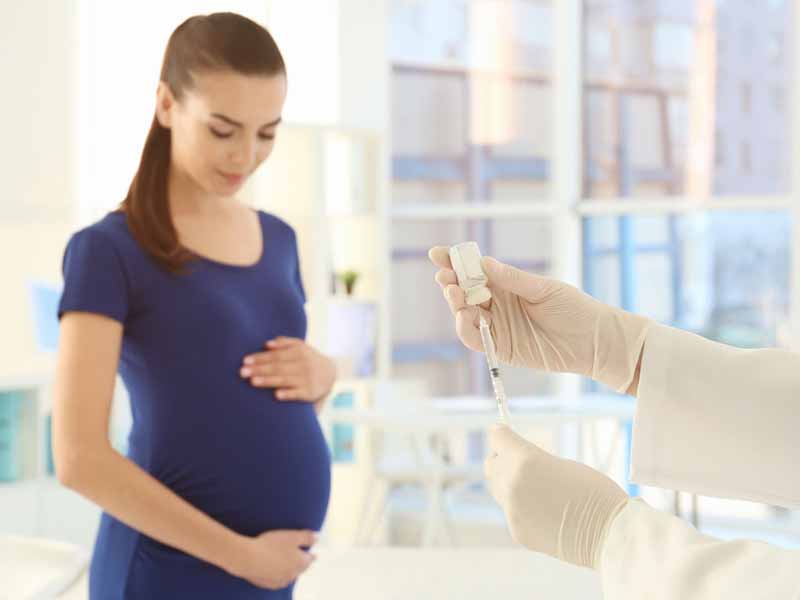Study Finds No Link Between IIV, Miscarriage
October 30, 2019 12:14 pm Chris Crawford – A study published in the journal Vaccine on Oct. 16 sought to determine whether an association exists between inactivated influenza vaccine administered to pregnant women during the three most recent influenza seasons (with available data) and spontaneous abortion among women who were and were not vaccinated during the previous flu season.
The analysis compared the influenza vaccination status during pregnancy of women who miscarried and controls after adjusting for other factors that could be associated with vaccination status and miscarriage.
Among 627 matched pairs who received the vaccine, no association was found between vaccination at any point during pregnancy and SAB.
These findings come on the heels of a September 2017 study also published in Vaccine that caused a stir when it detected what the authors termed "a safety signal for SAB following IIV" -- most notably an association of SAB in women who had received influenza vaccine in the preceding 28 days. This association was said to be more significant among women vaccinated during the previous flu season with vaccine containing the 2009 pandemic H1N1 strain. However, the study emphasized at the time that it could not establish a causal relationship between repeated influenza vaccination and SAB, warranting further research.
Story Highlights
A recent study examined whether an association exists between inactivated influenza vaccine administered during the three most recent influenza seasons and spontaneous abortion among women who were and were not vaccinated during the previous flu season.
The analysis compared the influenza vaccination status during pregnancy of women who miscarried and controls after adjusting for other factors that may be associated with vaccination status and miscarriage.
Among 627 matched pairs who were vaccinated during the previous season, no association was found between vaccination at any point during pregnancy and SAB.
After the previous study was released, the CDC responded by noting that the agency and its Advisory Committee on Immunization Practices had not changed the recommendation for influenza vaccination in pregnant women and continued to recommend that pregnant women get a flu shot during any trimester of pregnancy.
The CDC also recommended at the time that physicians talk with their pregnant patients about the flu vaccine and address any concerns they might have. The agency added that physicians should exercise their clinical judgment based on various factors, including the patient's health status, local influenza activity, and benefits versus potential risks from vaccination when deciding whether and/or when to immunize a patient against influenza.
The CDC has now updated its information and guidance on this subject to include details of this most recent study.
2019 Study Details
The observational, matched case-control study included pregnant women ages 18-44 at participating CDC Vaccine Safety Datalink sites in California, Colorado, Oregon, Washington and Wisconsin and spanned three influenza seasons: 2012-13, 2013-14 and 2014-15.
Women with miscarriage between six and 19 weeks gestational age were individually matched to other women who had a live birth. The case-control pairs were matched on age group, VSD site, date of last menstrual period and influenza vaccination status during the preceding season.
The primary analysis included 1,236 eligible matched pairs, including 627 pairs who were vaccinated in the previous season and 609 pairs who were not.
The median gestational age at the time of miscarriage was seven weeks -- the same measure as the 2017 study.
Women with miscarriage were significantly older and had higher body mass index than controls. A larger proportion of cases were ages 40-44 compared to controls. And cases were more likely to be African American and Hispanic and less likely to be Asian American than controls.
Frequency of previous miscarriage was similar for cases and controls.
The researchers pointed out that a strength of their investigation was the large study population, with the 1,236 case-control pairs in the primary analysis making it one of the largest case-control studies to examine whether an association exists between IIV and SAB.
AAFP Vaccine Science Fellow's Response
Madalyn Schaefgen, M.D., of Allentown, Pa., is a 2019-20 AAFP Vaccine Science Fellow; she told AAFP News that the discrepancy between the findings of the 2017 and 2019 studies isn't unusual, given that one study showing some signal followed by further studies attempting to reproduce those findings is what science is all about.
"When it's not reproducible, it's suspected as not being real in the first place," she said. "I would also suspect that further studies would be done to again verify that there is no evidence of increased risk of spontaneous abortions" when influenza vaccine is given during pregnancy.
Schaefgen said it's important to keep in mind that early pregnancy loss is common, so it's difficult to differentiate what caused it. And because studies of pregnant women are typically small in numbers, that limits the robustness of relevant research.
"The evidence of increased morbidly and mortality of influenza in pregnancy has been demonstrated in multiple studies," she said. "Immunization has been proven to lessen that risk. Also, there is evidence of transmission of antibodies to the fetus, thereby lessening the risk of influenza infection to the baby."
"We all know that a healthy mother helps to ensure a healthy baby," Schaefgen continued. "I advise mothers to get immunized; if not for themselves, do it for their babies."
